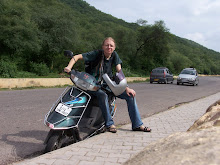Jaipur is going back to normal life. Though shaken, people of Jaipur don't give in. Jaipur has been known for it's very low crime rate and lack of tension between various religious communities. Both Hindus and Muslims have condemned the attack, and as one of the victims described: "Terrorism knows no religion. It kills everyone." Though the responsibility for the Tuesday bomb blasts was claimed by an islamic group, areas which were targeted belonged to both communities. Market at Badi Choupad is run mostly by Muslims and I remember happy bangle sellers from there who would offer their goods to burkha-clad ladies. At Johari Bazaar, not far from the blast site is a very popular Jama Masjid. On Friday special prayers were offered at the Mosque for the blast victims.
Here is an article from the Jaipur edition of "The Times of India" on that subject:
"Blasts fail to weaken Hindu-Muslim ties" - 17 May 2008, Avijit Ghosh,TNN
JAIPUR: It's late at night. And there's nothing really that distinguishes Islami Kallu Hotel from the rows of similar shops in Ramganj area. Except that it has far more customers than all other shops around. And the reason, says shop owner Kallu, is that it serves the best mutton qorma and other Mughlai delicacies in the town.
"My biggest customers are Hindus and they come from all parts of Jaipur. Some of them drive in from as far as 20 km to eat here," says his son Zahooruddin.
Designed to drive a wedge between the city's Hindus and Muslims, the Tuesday terror attack was meant to change all that. But it didn't happen. "Whoever was trying to divide the two communities has failed," says Kallu. It is 72 hours since the blasts and the Hindus are not back in big numbers yet. But Kallu, judging by the mood of the city and the way it has reacted everywhere, is sure that there won't be any big cracks in the relationship.
Apart from the respect for each other that comes with a sharing of lives, professional interdependence between the two communities has gone a long way in ensuring that the quality of relations doesn't dip. "Even in a restaurant like mine, there is plenty of inter-dependence. We buy ghee, oil, flour, vegetables, spices” everything from Hindus. I operate in cash but I am also open to credit with them," says Kallu.
Sitting outside Zahiruddin's Naeem Book Depot, Abdul Wahid says that many Muslim women make embroideries on fabrics. The factory owners who give them work are Hindus. "It's an economy of inter-dependence," he says. A few Muslims sitting around the shop reveal that they just hoped that the blasts would not cause a negative fall-out. "But the fact that there have been no repercussions shows that the worst is behind us. The maturity shown by citizens of Jaipur is an example to the world," says Wahid.
I P S Bagga, former president of Hawa Mahal Bazar Vyapar Mandal, estimates that Muslims form about 50% of shop owners in the Hawa Mahal area, about 35% in Johari Bazar and about 5% in Bapu Bazar. In several city-based industries such as gems and stones, shoes, fabrics.” the workers and the owners often are from different communities.
Figures are hard to come by but everyone admits that a majority of the artisans employed in cutting, polishing and shaping are Muslims. The owners are both Hindus and Muslims. Bagga sums up the situation: "The serial blasts have saddened people. But Hindu and Muslim shop owners have always cooperated with each other. That will never change."




No comments:
Post a Comment